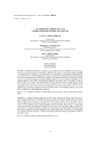Identificador persistente para citar o vincular este elemento:
https://accedacris.ulpgc.es/jspui/handle/10553/48231
| Campo DC | Valor | idioma |
|---|---|---|
| dc.contributor.author | Campos Rodriguez,Clara Margarita | en_US |
| dc.contributor.author | Santos Peñate, Dolores R. | en_US |
| dc.contributor.author | Moreno Pérez,José Andrés | en_US |
| dc.date.accessioned | 2018-11-23T19:59:28Z | - |
| dc.date.available | 2018-11-23T19:59:28Z | - |
| dc.date.issued | 2012 | en_US |
| dc.identifier.uri | https://accedacris.ulpgc.es/handle/10553/48231 | - |
| dc.description.abstract | A competitive location problem with two firms consists of locating the facilities of these two firms in order to optimize certain objectives. Normally, the objective is to maximize the profit or the market share. For the leader-follower problem the decision making is sequential, first the leader opens its facilities and later the follower enter the market installing facilities in the locations considered more convenient for her/him. We consider that the user decision criterion is based on her/his perception of the time required moving to the facility. This travel time is of vague nature since the customer takes into account that it depends on several factors such as the traffic conditions. Therefore the customer choice is modeled using the theory of fuzzy sets. We propose and solve the leader-follower problem assuming that customers base their decision on the comparison of fuzzy times required to have access to the services established by each competitor. The fuzzy set theory is a rigorous and effective instrument for dealing with problems in which the information is vague. | en_US |
| dc.language | spa | en_US |
| dc.relation.ispartof | Recta | en_US |
| dc.source | Recta,v. 13, p. 43-55 | en_US |
| dc.subject | 5311 Organización y dirección de empresas | en_US |
| dc.subject.other | Localización de empresas | en_US |
| dc.title | Localización competitiva con valoraciones difusas de los clientes | en_US |
| dc.type | info:eu-repo/semantics/Article | en_US |
| dc.type | Article | en_US |
| dc.identifier.scopus | 84875664786 | - |
| dc.contributor.authorscopusid | 6505993221 | - |
| dc.contributor.authorscopusid | 6506715299 | - |
| dc.contributor.authorscopusid | 6603409673 | - |
| dc.description.lastpage | 55 | - |
| dc.description.firstpage | 43 | - |
| dc.relation.volume | 13 | - |
| dc.investigacion | Ciencias Sociales y Jurídicas | en_US |
| dc.type2 | Artículo | en_US |
| dc.utils.revision | Sí | en_US |
| dc.date.coverdate | Diciembre 2012 | |
| dc.identifier.ulpgc | Sí | es |
| item.fulltext | Con texto completo | - |
| item.grantfulltext | open | - |
| crisitem.author.dept | GIR TIDES- Técnicas estadísticas bayesianas y de decisión en la economía y empresa | - |
| crisitem.author.dept | IU de Turismo y Desarrollo Económico Sostenible | - |
| crisitem.author.dept | Departamento de Métodos Cuantitativos en Economía y Gestión | - |
| crisitem.author.orcid | 0000-0002-2694-7943 | - |
| crisitem.author.parentorg | IU de Turismo y Desarrollo Económico Sostenible | - |
| crisitem.author.fullName | Campos Rodriguez,Clara Margarita | - |
| crisitem.author.fullName | Santos Peñate, Dolores Rosa | - |
| crisitem.author.fullName | Moreno Pérez,José Andrés | - |
| Colección: | Artículos | |
Visitas
28
actualizado el 18-mar-2023
Descargas
21
actualizado el 18-mar-2023
Google ScholarTM
Verifica
Comparte
Exporta metadatos
Los elementos en ULPGC accedaCRIS están protegidos por derechos de autor con todos los derechos reservados, a menos que se indique lo contrario.
